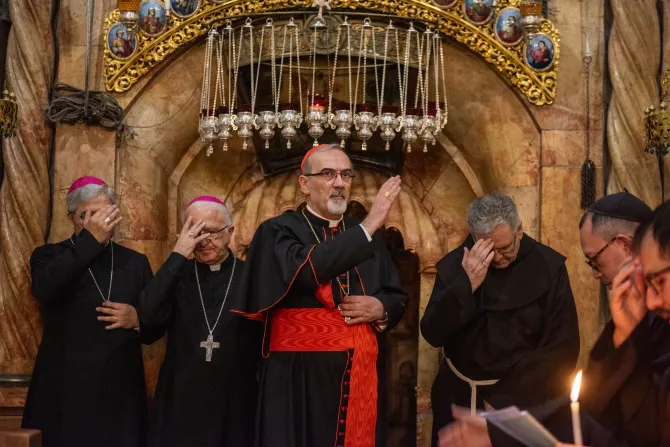When Cardinal Pierbattista Pizzaballa, the Latin Patriarch of Jerusalem, was created a cardinal by Pope Francis on Sept. 30, few would have imagined that within a week, he would find himself leading his Church amid one of the bloodiest conflicts in the region’s recent history.
The words “usque ad effusionem sanguinis” (“even to the shedding of blood”), used by the Church in the rite for the creation of a cardinal, suddenly became a harsh reality.
“The cardinalate’s red color has taken on a profound significance marked by much sorrow, by many hardships… Obviously, the Lord wants me here, he wants me to bring his grace to this place,” Pizzaballa said in an interview with CNA.
The interview was conducted at the headquarters of the Latin Patriarchate, from which he, with the help of his staff, coordinates initiatives to support the most afflicted and needy Christian communities. Just a few minutes after CNA’s conversation with him, news arrived of a bombing that grazed the Latin parish of the Holy Family in Gaza, causing some damage, but thankfully no casualties.
After the consistory at the Vatican in which he was made a cardinal, Pizzaballa had stayed in Rome for the opening Mass of the Synod on Synodality but made an abrupt return to Jerusalem due to the outbreak of the war. He has spent most of his time at the Latin Patriarchate’s headquarters as public events have been greatly restricted.
“The first Mass I celebrated outside of here was in the infirmary of the Franciscans,” where a friar of the Custody of the Holy Land passed away on Oct. 21. The second Mass was held at Deir Rafat, at the shrine of Our Lady, Queen of Palestine, the patroness of the diocese, on Oct. 29. During the celebration, a new act of consecration of the Holy Land to the Immaculate Heart of the Virgin Mary took place.
These were “intimate” yet significant moments that reflect the essence of his service: “I understood my creation as a cardinal as confirmation of a service that was already there and has now become even more demanding. I wonder what it means to be a shepherd here, at this moment, and in this complex and torn situation,” he said.
While there may not be a single answer, Pizzaballa shared some of his thoughts in his “Letter to the entire diocese,” dated Oct. 24: “What matters to me, and why I wrote the letter, is the need to provide guidance, because a shepherd must be the voice of his flock but also guide it. My concern right now is to provide an orientation, which — while taking into account the different opinions and sensitivities that exist in our diocese — has its roots in the Gospel. We all have to ask ourselves what the Gospel tells us. It’s not guaranteed that everyone will have the same answer — differences will remain — but it’s important that everyone asks the same question. The shepherd’s job is to help everyone ask the right question, which always refers to the person of Jesus.”
That letter, in which the cardinal, among other things, calls on his diocese to have the courage to “maintain unity, to feel united to one another, even in the diversity of our opinions, sensitivities, and visions,” has elicited various reactions among the faithful, including strong criticism.
“The fact that some have expressed their disagreement and have done so directly is a sign that they feel part of this Church. So, we need to talk about it, listen to each other, and try to understand each other’s reasons, each other’s pain, and each other’s struggles, without ostracizing, without being scandalized, but by welcoming and accompanying. I’ve also told others, ‘If something’s wrong, speak up. It’s better to talk about it than keep it inside,’” Pizzaballa said.
The image the patriarch has chosen to commemorate his being named a cardinal is that of Pentecost.
“The Church of Jerusalem,” the cardinal affirmed, “will always be a plural Church, composed of different cultures. It’s part of its nature.” Pizzaballa himself numbers among the foreigners in Jerusalem, being an Italian citizen, even though he has spent most of his life here.






